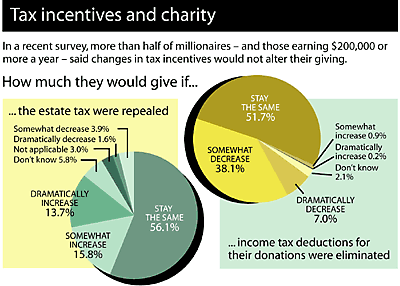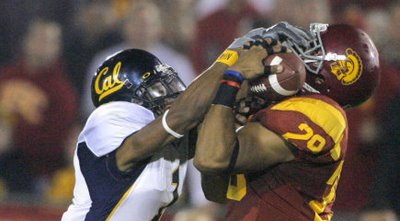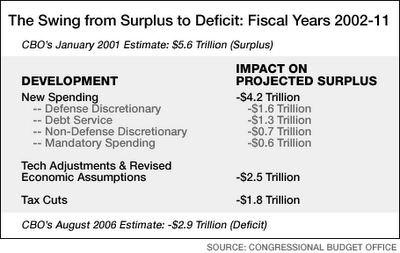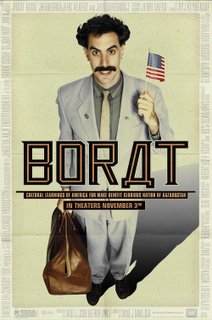
Over the last couple of days I have been exchanging views with an old friend who is convinced that the election told a story that I simply do not see. This afternoon, my son and I saw Borat the movie, and I began to think about my friend's views. Borat is a fairly shoddy characture of a foreign visitor. I believe my friend has made a fairly shoddy characture of what happened on Tuesday. He believes that the change which suggested in part.
"As to the GOP moderates you dislike, well, they were the linchpin for the GOP majority in Congress, and those seats will not come back. So there is no way the GOP wins back the House in 2008 or anytime in our lifetime. They have maxed out in the south and will continue losing in CA (Dreier is next) and in the moutnain west and mid-west. So I don't really care about the GOPers in the House, they don't matter anymore. They will be as irrelevant as the legislative GOPers."
This guy calls himself a Republican, which I do not. But he is absolutely apoplectic about the war in Iraq. (He is a Vietnam vet and draws some kind of parallel to the conflicts, which I at least do not find.) Thus, he revelled at the loss of the GOP and is absolutely ecstatic about the prospect that the democrats like Waxman will begin a process of investigating the administration. He was giddy about an effort by some minor politician in Germany to try to go after Rumsfeld under some bizarre theory of universal law. He actually compares Rumsfeld to Pinochet.
Both congressional parties are a lot like the reality that is created in the movie. Borat is a mildly offensive reality (sometimes more than mild). The American people clearly said on Tuesday that they disliked the reality of the GOP leadership. But as I have thought about it, where I differ from my friend is where that dissent manifests itself. I believe that the election was about corruption both personal (like Foley - although I think his personal situation changed very little in the election and institutional - Congress' standing is even lower than the President's). The problem for the republicans was in part based on their leadership style. They don't have that any more. We knew how Hastert and Frist would react to questions. We are not so sure about how the presumptive leader in the house (Boehner) and the Senate will react to the events of the day. We do know how the Administration will react, but in the last two years of a term many presidents become less relevant. What we do not know is how the new leadership in the House (Pelosi) will react. Pelosi is not a pragmatic leader. She has a cast of senior people who will chair committees who are significantly more liberal than the country. But she also has a large addition to her caucus who are a lot less committed to her point of view. On the GOP side, especially in the house, there are a lot fewer "moderates" and even some of the firebrand conservatives. (Don't underestimate the effects of the Hayworth loss.) In the Senate we know about Harry Reid. He, like the GOP leadership in the last congress, has the ability to operate on the brink of legitimacy.
So what happens in 2007 or more importantly what would my friend suggest? On the war. What specific would my friend do NOW to change - would he move us out immediately. Would he reinforce the notion across our enemies that when the tough gets going that we cut and run? There are indeed ideas that could be presented as alternatives to the existing policy in Iraq - but our realistic alternatives are quite limited. A lot depends on whether you believe that the primative Islamic forces are a long term threat to our way of life. But ultimately, while the American people are uneasy about the current strategy, I think they will also be uneasy about a disengagement that seems to cut and run. This is not an easy issue for either party.
On taxes, my friend has constantly nattered that the tax cuts of 2001 were wrong. But exactly what would he do differently? Would he raise the rates on capital gains and thus lower capital investment in the economy? Would he revert to the 2000 levels of inheritance taxes? Indeed, the last Congress, the realistic alternative to inheritance taxes was a significant increase in the exclusion (perhaps $5-10 million) and a retention of step up basis for remaining estates. If the dems forget that potential - they are likely to pay a heavy price in 2008.
Does he support, what seems to be the majority position in the democrats, the idea that free trade is a negative for the economy? If he does has he bothered to look at the long term economic effects of free trade on our economy?
Politics is ultimately the art of the possible (according to Bismarck). In this case a couple of things are clear about the results of the election. First, the GOP moderates, who have been a dying breed for the last two decades (I was actually a Washington Chapter President of the Ripon Society in the 1970s so I know something about "moderate" republicans), are dead. Second, that means the GOP is a bit more conservative than the last session. Third, the democrat caucus in the House is a bit more conservative than they were in the last Congress. There is clearly an issue for the democrat leadership between the liberals in the leadership and the new members who are a bit more conservative.
My friend is blinded to see that only one policy determined the outcome of the election. I also believe that much of the media also have that problem. Does that mean the GOP will recover these losses? I am not sure at this point. A lot depends on whether Pelosi and Reid are smart enough to listen to the new members of their respective houses. A clear message of Tuesday's vote was that the American people are very grumpy about the work of the Congress. If there is a perception that either side is obstructionist the penalty will be levied in 2008. At this point, both sides have an opportunity to define their field of play. Bush also has the opportunity to think more creatively about what will work in his last two years.
Borat is a disappointing movie because it intends to offend without worrying about its long term message. Unfortunately, the simplistic notions that this was a ground changing election has yet to be proven. The next several months will determine whether the simplistic notions raised by my good friend will come true. At this point, I believe they will not. But if the GOP believes they can continue what they did last year, they will be vanquished. If the dems assume that a minor victory is a long term mandate they will also be rejected just two years hence.


























